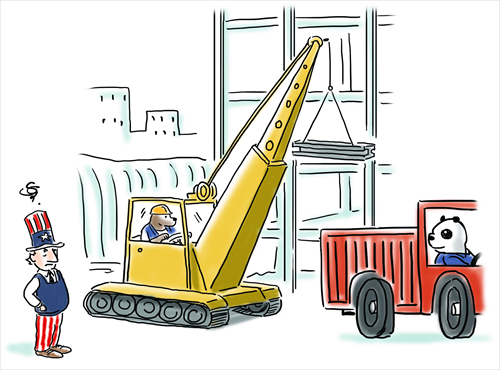Washington pressure pushing Moscow and Beijing closer

Illustration: Liu Rui/GT
The visit of Russian President Vladimir Putin to China and his talks with Chinese leader Xi Jinping again drew the attention of the international community to evolving relations among Russia, China and the US. Some experts believe that Russia and China are trying to create a new world order so as to replace the US as a global leader. Others claim that Russia and China are just trying to adjust themselves to the new emerging geopolitical configuration to make it more acceptable for both countries.
It is necessary to highlight some factors which shape the character of relations between Russia, China and the US. The first one deals with the unjustified perception in the US of the integration processes in the post-Soviet space, namely, the creation of the Eurasian Economic Union (EEU) which is wrongly regarded as a Russian attempt to revive the Soviet Union.
Second, the joint project to harmonize the EEU and the Chinese "Belt and Road" initiative is also seen as an attempt to counterbalance the influence of the US and its allies in Central Asia and beyond.
Third, the US and NATO leadership are returning to the strategy of deterrence of Russia and possible NATO expansion which brought us back to the time of the Cold War. Thus, the West pushes Russia to the east, closer to China.
The situation around China is not simple either. China is also under geopolitical pressure from the US and its allies. The regional security problem is acute here. First, there are territorial disputes where the US is not a passive observer. Second, the US makes every effort to keep its control over the sea routes and supply of resources, especially energy in Southeast Asia.
On the whole, the US pivot to the Asia-Pacific and the Trans-Pacific Partnership (TPP) is aimed at the deterrence and undermining of growing Chinese power and influence in the region. Thus, China is pushed to the west and toward Russia.
The only way to break through this geopolitical encirclement for China is to move closer to Russia and the EEU. The successful advancement of "Belt and Road" may reduce the dependence on routes through the South China Sea and the Strait of Malacca. So it may ease tensions between China and the US. The realization of the project will give independence and geopolitical and geoeconomic leverage to Russia and China.
Another essential opportunity to increase the weight and significance of Russia and China is the enhancing role of the Shanghai Cooperation Organization (SCO). This year the SCO celebrates its 15th anniversary. According to Putin, the enlargement of its spheres and the growing number of its members has made this organization more powerful and more necessary both in the region and in the world. The economic potential of the SCO will be realized in the creation of the common trade space which will also open up new opportunities.
At the same time, it would be undesirable if this successful connectivity leads to a hostile attitude toward the US and its allies. The connectivity should not have a confrontational character against the EU and the US. The common interest is to establish partnerships between European and Eurasian projects with the active participation of China.
Despite economic sanctions, the EU is still an important partner for Russia while China has close economic ties with the US. It would be detrimental to develop any projects between Russia and China at the expense of relations with Western partners.
The strategic goal of the connectivity of projects and the increased role of the SCO should be the creation of political and economic Eurasian partnership on the basis of complementarity which is open to new members and projects. This kind of arrangement should not be aimed at replacing the US as a global leader but at being another pillar of regional, and maybe global, political and economic systems in the future. It should be an alternative for those who would not like to put a stake on the US and the institutions it leads.
The author is Vice-Rector of Research, Moscow-based Diplomatic Academy. opinion@globaltimes.com.cn